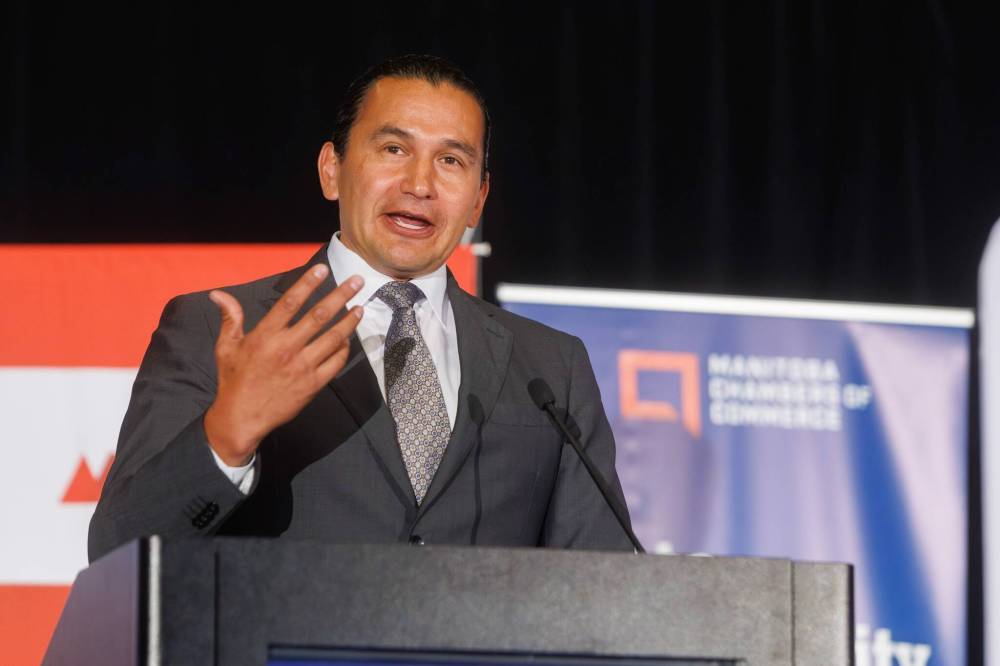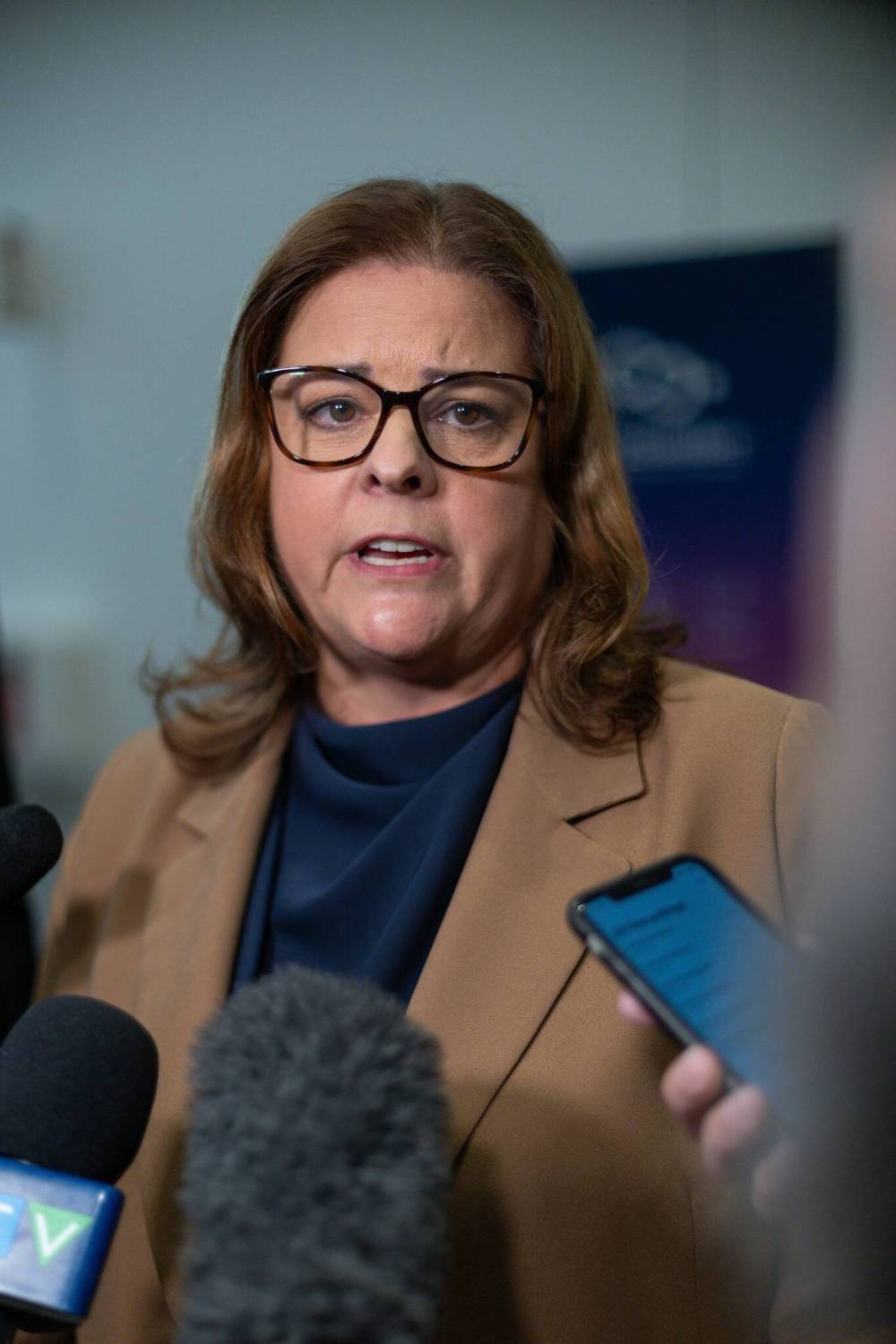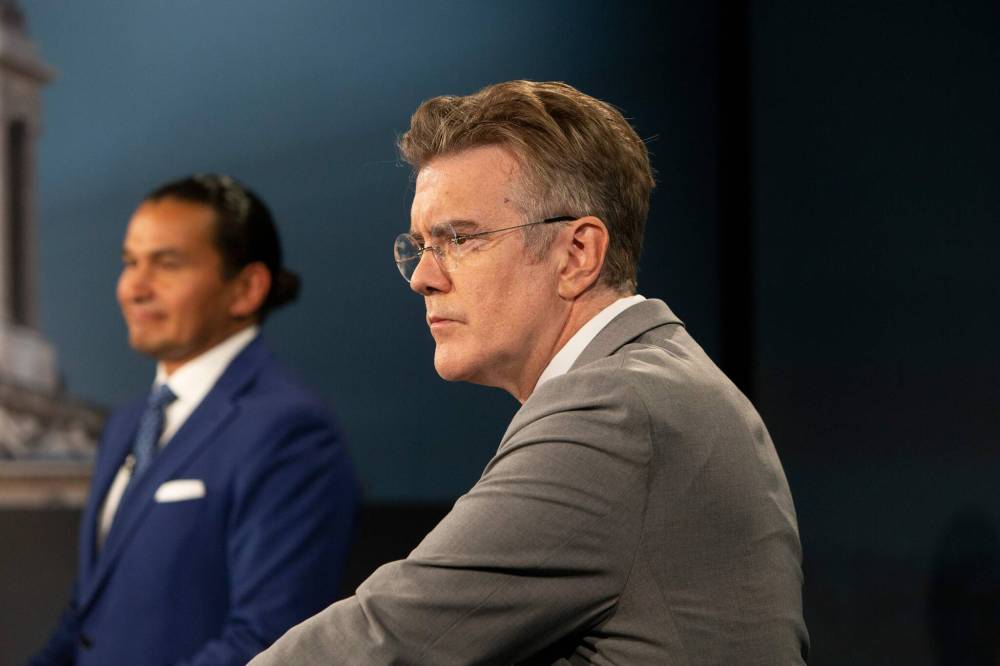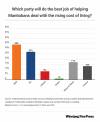A question of faith Leaders of Manitoba’s three main political parties weigh in on issues important to religious communities ahead of next week’s provincial election
Read this article for free:
or
Already have an account? Log in here »
To continue reading, please subscribe:
Monthly Digital Subscription
$0 for the first 4 weeks*
- Enjoy unlimited reading on winnipegfreepress.com
- Read the E-Edition, our digital replica newspaper
- Access News Break, our award-winning app
- Play interactive puzzles
*No charge for 4 weeks then price increases to the regular rate of $19.95 plus GST every four weeks. Offer available to new and qualified returning subscribers only. Cancel any time.
Monthly Digital Subscription
$4.99/week*
- Enjoy unlimited reading on winnipegfreepress.com
- Read the E-Edition, our digital replica newspaper
- Access News Break, our award-winning app
- Play interactive puzzles
*Billed as $19.95 plus GST every four weeks. Cancel any time.
To continue reading, please subscribe:
Add Free Press access to your Brandon Sun subscription for only an additional
$1 for the first 4 weeks*
*Your next subscription payment will increase by $1.00 and you will be charged $16.99 plus GST for four weeks. After four weeks, your payment will increase to $23.99 plus GST every four weeks.
Read unlimited articles for free today:
or
Already have an account? Log in here »
Hey there, time traveller!
This article was published 24/09/2023 (839 days ago), so information in it may no longer be current.
Manitobans will elect a new government next Tuesday, and whether the Heather Stefanson-led Progressive Conservatives, Wab Kinew-led NDP or Dougald Lamont-led Liberals prevail, some voters may wonder how they will engage and interact with the faith community.
I asked them five questions about that. Stefanson and Lamont sent e-mail responses; Kinew made himself available for an interview. Their answers follow:
What will you do as premier to recognize and support the efforts of Manitoba faith groups to serve the most vulnerable and others in the province?
Could you see the provincial government doing more to partner with faith groups to address social issues?
Wab Kinew: One of the commitments I’ve made is we want to end chronic homelessness in Manitoba. One of the first things we have to do is bring together everyone who is working in this space to set up a shared mission and vision to end chronic homelessness.
I would very much want to include faith groups, churches, mosques and other spiritual organizations, who are already doing some of this kind of work, but also the faith-guided institutions, not-for-profits… that have spirituality as part of their mandate.
I would want them at the table when we set up a working group to work towards ending chronic homelessness and also meeting the needs of the most vulnerable when it comes to providing food, sustenance and also help with addictions, to help them turn their lives around.
Financial support would be part of the discussion after first bringing people together to conduct a needs assessment to see what the following steps would need to be.
MIKE DEAL / WINNIPEG FREE PRESS FILES “I’m a spiritual person. I follow the Anishinaabe tradition. I start each day with a prayer, even before I have my morning cup of coffee,” says NDP Leader Wab Kinew.
Heather Stefanson: As premier, I am always amazed by the compassion and selfless dedication of so many people of faith throughout our province.
Our Progressive Conservative team is recognizing the extraordinary contributions of Manitoba’s faith communities by nearly doubling the charitable donation tax credit, meaning that Manitobans who give to their local church, mosque or temple will receive 20 per cent back on the first $200 donated and 25 per cent back on all donations over $200.
Our party believes that Manitoba’s diverse faith communities are dynamic and can be far more responsive to community needs as they arise than even government bureaucracies. We can learn so much from faith communities about how to make our province safer and healthier, and we will continue to explore creative partnerships with faith leaders to make our province a better place for all Manitobans.
Dougald Lamont: Manitoba Liberals are committed to working with all Manitobans and all stakeholders regardless of faith. We recognize that our most important public institutions — our hospitals, our places of learning — like universities and colleges — were all originally places founded on faith.
There is a tremendous amount of positive work that is done by faith groups, and Manitoba Liberals would be willing to work with them to ensure the needs of the community are being served, whether it is helping the vulnerable, providing training or doing good work.
A big concern for Jews and Muslims in Manitoba is antisemitism and Islamophobia.
What will you do as premier to address and combat those things and support the local Jewish and Muslim communities and help people from those communities feel safe?
Kinew: The first step is, as a leader, you have a responsibility to speak out when there is hatred in the community. When there are examples of Islamophobia and antisemitism, to condemn them and speak publicly about unity and bringing Manitobans together from all backgrounds to pursue our shared vision as a province.
I think it goes beyond that to the education system. I know there is a lot of good work being done by educators to teach about human rights and Holocaust education. But I think as part of the work to update Manitoba school curricula we should be including these conversations about hatred, and ensure we are helping all young Manitobans to embrace a spirit of inclusion.
I would certainly reach out to Jewish and Muslim groups to see what they can offer, and also to educators to ensure their expertise is counted on as we try to share these messages that can break down barriers between communities.
I’ve been lucky in my time in politics so far to have had invitations to attend mosques in the wake of examples of Islamophobia so I can learn, so I can hear. I’ve been very honoured to have a chance to build a strong relationship with people in the Jewish community, which has included those conversations about antisemitism and responding to acts of hatred that we need to come together to combat.
If I get the chance to serve as premier, I would want to strengthen those relationships even further to carry on the work through leading the province in building relationships across communities.
MIKE DEAL / WINNIPEG FREE PRESS FILES “Our PC team includes people of diverse faith traditions, and I hear regularly from them about the issues that matter to their communities,” says Progressive Conservative party Leader Heather Stefanson.
Stefanson: Our Progressive Conservative team stands with Manitoba’s Jewish and Muslim communities, and we stand against antisemitism and Islamophobia in our province.
Last year, our Progressive Conservative government adopted the International Holocaust Remembrance Alliance definition of antisemitism. The definition helps our entire province to remain extremely vigilant in identifying and addressing antisemitism throughout Manitoba. It will help us to fight back against the alarming rise in antisemitic incidents in our province and our country.
Similarly, our entire PC team stands against Islamophobia. Last year, Manitobans elected Obby Khan, our PC candidate in Fort Whyte, as the first Muslim to serve as a member of the Manitoba Legislative Assembly. He has been outspoken about the importance of faith in his life, and he will continue to be our leader in government when it comes to addressing Islamophobia in all its forms.
Lamont: We recognize that some faith communities and their members face terrible treatment for no other reason that they are members of their faith. They are subject to discrimination and mistreatment based on myths and conspiracy theories that are harmful.
Manitoba is a province founded on the basis of religious and linguistic diversity, and we need to live up to those principles.
Manitoba Liberals obtained a unanimous vote of the legislature, defending Jews against antisemitism with a resolution confirming the (International Holocaust Remembrance Alliance) definition of antisemitism. Dr. Jon Gerrard, MLA River Heights, was instrumental in bringing it forward.
We also recognize the critical need to ensure (there are) similar resolutions condemning hatred and discrimination towards Muslims.
Through parish nursing, places of worship invite retired nurses or doctors to serve the health-care needs of people in their congregations. The goal is to help people, especially seniors, stay in their homes longer and get basic medical services to keep them out of the health-care system.
Would your government be open to exploring the potential of parish nursing as a way to partner with faith groups to help meet the health-care needs of Manitobans?
Kinew: The concept of parish nursing strikes me as a great opportunity to implement preventative medicine and community-based care.
It offers the potential to have a setting where seniors and other members of the community are already comfortable, an opportunity to reach out to those folks in that setting and provide some prevention, some pro-active care, so we can maybe prevent issues from becoming more serious in the future, or just provide them with a better quality of life.
I find it an interesting idea that’s worthy that we should definitely be open to supporting.
Stefanson: Parish nursing is an innovative way to meet the health-care needs of elderly parishioners, and it can have a positive impact on the overall health-care system through preventative community care.
I am thrilled to see nurses contribute to their church communities in this way, and I am certainly open to working with nurses, faith leaders and parishioners to expand these services in Manitoba.
Lamont: Parish nursing is an intriguing concept. One of its most important aspects is that it is out in the community, where it should be.
The central core of our health-care platform is to focus on better community care — ensuring that every person has a family physician or nurse practitioner.
In addition to that, however, we want to focus on providing wraparound supports in a clinic. We will enhance pay for family doctors so they can spend more time with patients when needed and ensure that team members are paid for working together (which they are not now).
Our goal is to have more wraparound community clinics providing primary care. We would also hire nurse practitioners to work in (personal-care homes).
BROOK JONES / WINNIPEG FREE PRESS FILES “Manitoba Liberals are committed to working with all Manitobans and all stakeholders regardless of faith,” says Liberal Party Leader Dougald Lamont.
Winnipeg’s mayor has created a new multi-faith and culture liaison circle to address societal issues such as homelessness, hunger and inequity.
Would you, as premier, be open to creating such a provincewide circle to address those issues and ensure faith voices are heard?
Kinew: I think I would be open to that. I would want to include some of these leaders and voices who work on chronic homelessness in Manitoba, as well as to take into account some of these folks when we’re thinking about the appointments governments make to boards and committees and Crown corporations.
Stefanson: As premier, I have met with diverse faith communities throughout Manitoba, and I continue to meet regularly with faith leaders. Moreover, our PC team includes people of diverse faith traditions, and I hear regularly from them about the issues that matter to their communities.
I am always open to listening to Manitobans with new suggestions about how to engage more deeply and effectively with Manitoba’s incredible faith communities.
Lamont: Yes, we would absolutely be willing to work with the leaders of diverse faith and cultural groups in order to listen to their concerns and respond and change as needed. In the aftermath of the pandemic, there is a great degree of mistrust and division, and our social fabric has been frayed and broken.
This is a time for community-building. Manitoba Liberals, as a foundational principle, believe that government must serve everyone.
Anything else to add, including if you want to say anything about your own faith background or interest in spiritual matters.
Kinew: I’m a spiritual person. I follow the Anishinaabe tradition. I start each day with a prayer, even before I have my morning cup of coffee. I try to get up before the sun and spend some time praying.
I’ve been very moved over the month of campaigning to hear from many Manitobans from many walks of life who have taken the time to pray for us, to pray for our team that we be well and travel safely and are able to move forward in a good way.
It’s been really meaningful on a human level, taking time to share with us their faith, their beliefs to send us a positive message through prayer.
Lamont: It is hard to understate the impact of the faith community on the development of Manitoba and its most important institutions, while recognizing that Winnipeg has always had an extraordinary level of cultural and religious diversity.
The foundational principle of being a liberal is the belief in the rights and freedoms of the individual, and the recognition that every living, breathing person is entitled to equal access to those rights, freedom and justice, by virtue of being human.
Stefanson: Did not respond to the question.
faith@freepress.mb.ca
The Free Press is committed to covering faith in Manitoba. If you appreciate that coverage, help us do more! Your contribution of $10, $25 or more will allow us to deepen our reporting about faith in the province. Thanks! BECOME A FAITH JOURNALISM SUPPORTER

John Longhurst has been writing for Winnipeg's faith pages since 2003. He also writes for Religion News Service in the U.S., and blogs about the media, marketing and communications at Making the News.
Our newsroom depends on a growing audience of readers to power our journalism. If you are not a paid reader, please consider becoming a subscriber.
Our newsroom depends on its audience of readers to power our journalism. Thank you for your support.
The Free Press acknowledges the financial support it receives from members of the city’s faith community, which makes our coverage of religion possible.
















